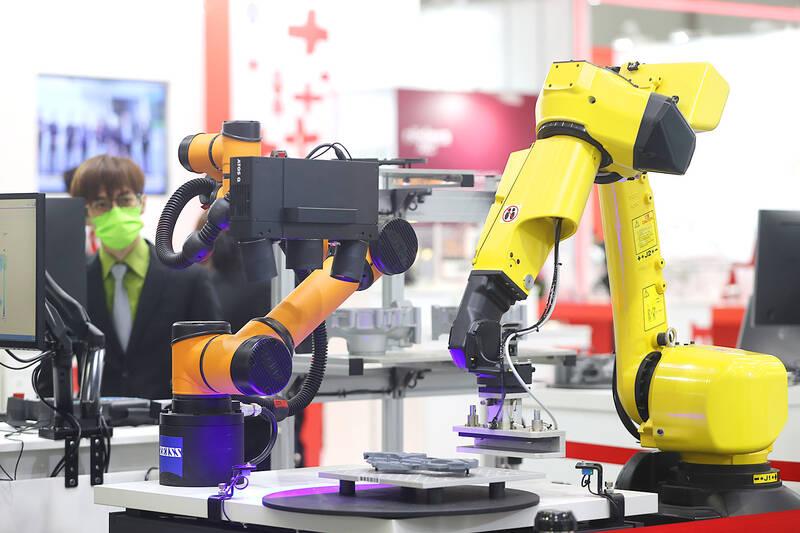The Ministry of Economic Affairs (MOEA) said yesterday that it has tightened controls on machine tool exports to prevent their use by Russia in its war against Ukraine, after the Washington Post reported a few Taiwanese companies had sold US$20 million of equipment which ended up in the hands of Russian arms makers.
The ministry's response came after the Washington Post reported on Thursday that since January last year, Russian company I Machine Technology has imported over US$20 million of sophisticated equipment called CNC machine tools. The tools are made in Taiwan, including by a similarly named Taiwanese trading company called I Machine Tools Corp (集盛).
The computer-controlled machines are used for complex and precise manufacturing that is critical to many industries, including weapons production, the Post reported.

Photo: CNA
The ministry said the measures it has adopted to prevent similar reoccurrences included placing I Machine Technology, which is accused of re-directing Taiwanese-made precision equipment to Russian arms makers, on a blacklist last month.
The list has so far banned 1,900 entities from receiving such products from manufacturers, the ministry said.
According to the ministry, it has also requested Taiwanese manufacturers exporting to countries such as Turkey and the United Arab Emirates, which are considered to have a high risk of reshipping the products, to agree not to redirect shipments to Russia and Belarus.
In addition, the penalty for first-time violations of exporting to Russia has been increased by over 15 times to NT$1 million (US$32,055), the ministry said.
The Post said those shipments imported by I Machine Technology probably violated prohibitions Taiwan and the West imposed in January last year on the sale of technology to Russia, in response to the Ukraine war.
Both I Machine Technology and the Taiwan-based I Machine Tools have denied such accusations, stressing that the shipments involved only spare parts that were not subject to export controls, the report said.
According to the Post, the MOEA had declined to comment on whether the Taiwanese companies identified in its report had violated the export controls, but said in a statement that the Taiwanese government is planning to bar local companies from selling their goods to I Machine Technology out of concern they could be used for weapons production.

SEMICONDUCTORS: The German laser and plasma generator company will expand its local services as its specialized offerings support Taiwan’s semiconductor industries Trumpf SE + Co KG, a global leader in supplying laser technology and plasma generators used in chip production, is expanding its investments in Taiwan in an effort to deeply integrate into the global semiconductor supply chain in the pursuit of growth. The company, headquartered in Ditzingen, Germany, has invested significantly in a newly inaugurated regional technical center for plasma generators in Taoyuan, its latest expansion in Taiwan after being engaged in various industries for more than 25 years. The center, the first of its kind Trumpf built outside Germany, aims to serve customers from Taiwan, Japan, Southeast Asia and South Korea,

Gasoline and diesel prices at domestic fuel stations are to fall NT$0.2 per liter this week, down for a second consecutive week, CPC Corp, Taiwan (台灣中油) and Formosa Petrochemical Corp (台塑石化) announced yesterday. Effective today, gasoline prices at CPC and Formosa stations are to drop to NT$26.4, NT$27.9 and NT$29.9 per liter for 92, 95 and 98-octane unleaded gasoline respectively, the companies said in separate statements. The price of premium diesel is to fall to NT$24.8 per liter at CPC stations and NT$24.6 at Formosa pumps, they said. The price adjustments came even as international crude oil prices rose last week, as traders

SIZE MATTERS: TSMC started phasing out 8-inch wafer production last year, while Samsung is more aggressively retiring 8-inch capacity, TrendForce said Chipmakers are expected to raise prices of 8-inch wafers by up to 20 percent this year on concern over supply constraints as major contract chipmakers Taiwan Semiconductor Manufacturing Co (TSMC, 台積電) and Samsung Electronics Co gradually retire less advanced wafer capacity, TrendForce Corp (集邦科技) said yesterday. It is the first significant across-the-board price hike since a global semiconductor correction in 2023, the Taipei-based market researcher said in a report. Global 8-inch wafer capacity slid 0.3 percent year-on-year last year, although 8-inch wafer prices still hovered at relatively stable levels throughout the year, TrendForce said. The downward trend is expected to continue this year,

Taiwan Semiconductor Manufacturing Co (TSMC, 台積電), which supplies advanced chips to Nvidia Corp and Apple Inc, yesterday reported NT$1.046 trillion (US$33.1 billion) in revenue for last quarter, driven by constantly strong demand for artificial intelligence (AI) chips, falling in the upper end of its forecast. Based on TSMC’s financial guidance, revenue would expand about 22 percent sequentially to the range from US$32.2 billion to US$33.4 billion during the final quarter of 2024, it told investors in October last year. Last year in total, revenue jumped 31.61 percent to NT$3.81 trillion, compared with NT$2.89 trillion generated in the year before, according to